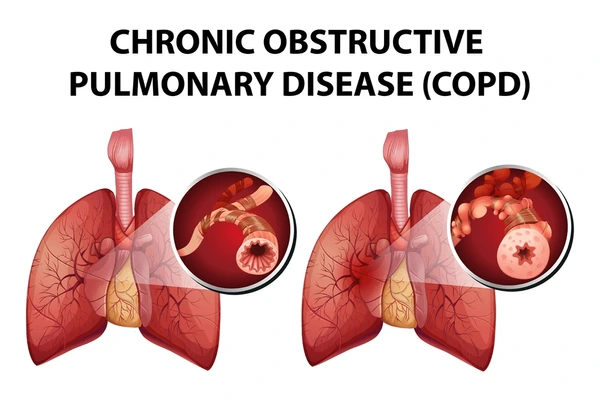Table of Contents
Brief The Article:
Zinc and Lungs: A Vital Connection
- Zinc is essential for a robust immune system, particularly for lung health.
The Impact of Zinc Deficiency on Lung Health:
- Increased Duration of Lung Infections: Without sufficient zinc, lung infections may linger for a longer time.
- Impaired T-Cell Function: Zinc deficiency weakens the body’s three primary types of T-cells, hindering their ability to fight infections and regulate immune responses.
- Killer T-cells target and destroy viruses.
- Helper T-cells coordinate immune responses and enhance other immune cells.
- Regulatory T-cells suppress overactive immune responses and help prevent autoimmune conditions.
- Increased Cytokines: Zinc deficiency can lead to an overproduction of cytokines, potentially causing excessive inflammation and even cytokine storms, a severe inflammatory reaction that can damage the lungs.
- Increased Risk of Lung Infections: A lack of zinc makes individuals more susceptible to various lung infections.
- Increased Risk of COPD: Chronic Obstructive Pulmonary Disease (COPD) is often associated with zinc deficiency.
- Increased Risk of ARDS, Upper, and Lower Respiratory Infections: Individuals with zinc deficiency face a higher risk of developing Acute Respiratory Distress Syndrome (ARDS), along with upper and lower respiratory tract infections.
- Increased Susceptibility to Ventilator-Induced Injury: Low zinc levels can make the lungs more vulnerable to injury caused by mechanical ventilation, which can be life-threatening. Zinc, however, offers some protection against this damage.
Infection and Zinc Deficiency:
- Lung infections further deplete zinc levels, creating a vicious cycle that makes it harder for the body to fight the infection.
Key Takeaway:
Zinc plays a critical role in supporting healthy lungs and bolstering the immune system’s defense against respiratory infections. Ensuring adequate zinc intake through diet or supplementation can help reduce the risk of developing various lung conditions and promote overall respiratory health.
So let’s dive into the details…
Zinc and Lungs: The Impact of Zinc on Respiratory Health

Let’s talk about the effects of zinc on your respiratory system. Zinc is so connected to the immune system, especially your lungs, that I thought I’d just do one topic dedicated to that. Zinc and lungs share a vital relationship for maintaining optimal respiratory health.
Zinc Deficiencies and Lungs: Duration of Lung Infection
One topic: if you’re deficient in zinc, the duration of lung infection is increased.
Zinc deficiency can prolong the duration of lung infections.
Zinc and Lungs: Decreased T-Cell Function

Next one: if you’re deficient in zinc, you’ll have diminished T-cell function. There are three main types of T-cells, and this stands for thymus; these are immune cells.
You have the killer T-cells, which specialize in killing viruses. You have the helper T cells, which are the coordinating unit, very, very important in all aspects of your immune system.
They recruit the backup army, they increase the killing power of phagocytes, they are a real essential and key coordinator for the entire immune system, and they’re greatly affected by the level of zinc in the body.
- Zinc deficiency can impair T-cell function.
- Three main types of T-cells:
- Killer T cells: Target and destroy viruses.
- Helper T cells: Coordinate immune responses, recruit immune cells, and enhance the activity of other immune cells (phagocytes).
- Regulatory T cells: Suppress excessive immune responses and prevent autoimmune reactions.
And then you have another T cell called a regulatory T-cell, and what this cell does is it suppresses the overreaction of the immune system.
It also prevents autoimmune diseases. And if this cell is weak, you’ll have a tendency to have asthma, allergies, and even excessive inflammation that seems to linger, and it goes into a chronic phase. Your T cells really need zinc.
- Zinc is essential for the function of all three types of T-cells, playing a crucial role in regulating the immune system and preventing chronic inflammation.
Zinc and Lungs: Increased Cytokines

Next point is that if you’re zinc deficient, you’ll have a lot more cytokines. Cytokines have many different functions, one being messengers, and another one is pro-inflammatory.
So it can cause inflammation. That’s all part of the immune process, but sometimes it gets out of hand. When considering the relationship between zinc and lungs, cytokine regulation is an important factor.
- Zinc deficiency can lead to increased cytokine production.
- Cytokines are signaling molecules involved in immune responses, but excessive production can lead to excessive inflammation.
So if you’re deficient in zinc, you can potentially even go into a cytokine storm where you have this serious inflammatory condition of the lung, and that can lead to scar tissue.
Zinc deficiency could be a contributing factor to this right here. By the way, zinc is a great anti-inflammatory in general.
- Zinc deficiency can contribute to cytokine storms, which are severe inflammatory reactions that can cause lung damage.
- Zinc has anti-inflammatory properties.
Zinc and Lungs: Increased Risk of Lung Infections
And if you’re deficient in zinc, your risk for getting lung infections does go up.
- Zinc deficiency increases susceptibility to lung infections.
Zinc and Lungs: COPD

When you have conditions like COPD, chronic obstructive pulmonary disease, you’re nearly always deficient in zinc. Zinc and lungs are intricately linked, with COPD often being associated with zinc deficiency.
- Zinc deficiency is common in individuals with COPD (chronic obstructive pulmonary disease).
Zinc and Lungs: Increased Risk for ARDS, Upper Respiratory Infections, and Lower Respiratory Infections
Your risk goes up for ARDS, which stands for acute respiratory distress syndrome. Also, you’re more at risk for upper respiratory tract infections as well as lower respiratory tract infections.
- Zinc deficiency increases the risk of:
- ARDS (acute respiratory distress syndrome)
- Upper respiratory tract infections
- Lower respiratory tract infections
Zinc and Lungs: Ventilator-Induced Injury

Now this next one is very interesting. Low levels of zinc can make the lungs more susceptible to ventilator-induced injury. The interaction of zinc and lungs can be crucial in critical care settings.
Zinc deficiency can increase the risk of ventilator-induced lung injury.
Now, when you get on a ventilator, which is a breathing machine, your risk of mortality goes up; the chances of you surviving are less.
What this does is it puts a lot of pressure into the lungs and oxygen, and if the lungs are already weakened, this could create some additional damage which you don’t want.
- Ventilator use can put pressure on the lungs and, if they are weakened, can cause further damage.
Oh, zinc can actually help protect the lungs against this damage to a certain degree, and that study I will put down below, and it’s called “Zinc Deficiency Primes the Lung for a Ventilator-Induced Injury.” Fascinating.
- Zinc can help protect the lungs from ventilator-induced injury.
Zinc and Lungs: What to Know About a Zinc Deficiency
If you have a lung infection, if you’re sick, your body is going to be using so much zinc, chances are you’re going to be deficient.
Just the fact that you have an infection causes a depletion of zinc, and then you lose more ability to fight the infection.
- Infections, including lung infections, can deplete zinc levels, making it harder for the body to fight the infection.
All right, so the next question is, what foods do you eat to get zinc, and what are the things that can prevent you from absorbing zinc? For that, you need to check this topic out right here.
Summary
Potential situations that could occur if you’re deficient in zinc:
• Increased duration of lung infections
• Diminished T cell function
• Increased cytokines
• Increased risk of lung infections
• People with conditions like COPD are typically deficient in zinc
• Increased risk for ARDS, upper respiratory infections, and lower respiratory infections
• Increased susceptibility of the lungs to ventilator-induced injury
If you have a lung infection, your body is going to be using so much zinc that chances are you could become deficient. The infection itself can cause a depletion of zinc, and then you lose more of the ability to fight the infection.
Additional-resources
FAQ
How does zinc affect the respiratory system?
Zinc plays a crucial role in maintaining respiratory health:
- Immune Function: Enhances immune response in the respiratory tract.
- Antioxidant Properties: Protects lung tissue from oxidative stress.
- Anti-inflammatory Effects: Reduces inflammation in the airways.
- Mucociliary Clearance: Supports the function of cilia in clearing mucus.
- Epithelial Barrier Integrity: Strengthens the lining of the respiratory tract.
- Cellular Repair: Aids in the repair and regeneration of lung tissue.
- Respiratory Enzyme Function: Supports enzymes involved in respiratory processes.
Adequate zinc levels are essential for optimal respiratory system function and protection against infections.
Does zinc help the lungs?
Yes, zinc provides several benefits for lung health:
- Infection Prevention: Boosts immune defense against respiratory pathogens.
- Tissue Protection: Acts as an antioxidant, protecting lung tissue from damage.
- Inflammation Reduction: Helps manage chronic lung inflammation.
- Respiratory Function: Supports overall lung function and capacity.
- Wound Healing: Aids in the repair of damaged lung tissue.
- Mucus Regulation: Helps maintain proper mucus consistency and clearance.
- Allergic Response Modulation: May help reduce allergic reactions in the lungs.
Zinc supplementation can be particularly beneficial for those with respiratory conditions or increased risk of lung infections.
How does zinc affect asthma?
Zinc can have several positive effects on asthma management:
- Airway Inflammation: Helps reduce inflammation in the bronchial tubes.
- Immune Modulation: Balances immune responses that contribute to asthma symptoms.
- Antioxidant Action: Protects lung tissue from oxidative stress associated with asthma.
- Bronchodilation: May support the relaxation of airway muscles.
- Mucus Regulation: Helps maintain proper mucus consistency, aiding in clearance.
- Respiratory Infection Prevention: Boosts defense against infections that can trigger asthma.
- Corticosteroid Efficacy: May enhance the effectiveness of inhaled corticosteroids.
While zinc is not a replacement for prescribed asthma medications, adequate levels may help improve overall asthma control.
How much zinc for COPD?
Zinc dosage for COPD (Chronic Obstructive Pulmonary Disease) patients:
- General Recommendation: 15-30 mg of elemental zinc daily.
- Higher Doses: Up to 45 mg daily may be recommended in severe cases.
- Duration: Long-term supplementation under medical supervision.
- Form: Zinc gluconate or zinc acetate are common forms.
- Timing: Best taken with meals to reduce gastrointestinal side effects.
- Monitoring: Regular blood tests to check zinc levels may be necessary.
- Individualization: Dosage should be adjusted based on individual needs and response.
Always consult a healthcare provider before starting zinc supplementation for COPD.
Best zinc supplement for lungs
When choosing a zinc supplement for lung health, consider:
- Zinc Picolinate: Highly absorbable form, good for overall lung health.
- Zinc Acetate: Effective for respiratory infections and immune support.
- Zinc Gluconate: Well-tolerated and commonly used for respiratory health.
- Zinc Carnosine: May offer additional mucosal protection.
- Zinc Citrate: Another easily absorbed form, good for general lung support.
- Zinc Orotate: Potentially beneficial for tissue repair in the lungs.
- Zinc Glycinate: Gentle on the stomach and well-absorbed.
Choose a high-quality, third-party tested supplement and consult with a healthcare provider for personalized recommendations.
How much zinc for lungs
Zinc dosage for lung health varies based on individual needs:
- General Health: 8-11 mg daily for adults (RDA).
- Respiratory Support: 15-30 mg daily may be beneficial.
- Acute Respiratory Infections: Up to 75 mg daily for short-term use.
- COPD: 15-45 mg daily, depending on severity.
- Preventive Dose: 15-20 mg daily for those at risk of respiratory issues.
- Upper Limit: Do not exceed 40 mg daily for long-term use without medical supervision.
- Individualization: Dosage should be adjusted based on age, health status, and specific lung conditions.
Always consult a healthcare professional before starting a zinc regimen for lung health.
Zinc lung inflammation
Zinc plays a crucial role in managing lung inflammation:
- Anti-inflammatory Properties: Reduces the production of pro-inflammatory cytokines.
- NF-κB Regulation: Modulates this key inflammatory pathway in lung tissue.
- Oxidative Stress Reduction: Acts as an antioxidant, minimizing inflammation-inducing free radicals.
- Immune Cell Modulation: Balances the activity of immune cells involved in inflammation.
- Epithelial Barrier Protection: Strengthens lung tissue against inflammatory damage.
- Resolution of Inflammation: Supports the body’s natural inflammation resolution processes.
- Enzymatic Activity: Influences enzymes involved in inflammatory cascades.
Adequate zinc levels can help manage chronic lung inflammation associated with various respiratory conditions.
Zinc reverses lung damage
While zinc can’t completely reverse lung damage, it can support lung repair and function:
- Tissue Regeneration: Aids in the repair of damaged lung epithelial cells.
- Antioxidant Action: Protects against further oxidative damage to lung tissue.
- Anti-fibrotic Effects: May help reduce lung fibrosis in some conditions.
- Immune Support: Enhances immune function to prevent further lung damage.
- Inflammation Reduction: Helps manage chronic inflammation that can worsen damage.
- Cellular Energy Production: Supports mitochondrial function in lung cells.
- Matrix Metalloproteinase Regulation: Influences enzymes involved in tissue remodeling.
While zinc is beneficial, it should be part of a comprehensive approach to lung health under medical supervision.
Is zinc good for COPD patients
Zinc can be beneficial for COPD patients in several ways:
- Immune Enhancement: Boosts immune function to reduce infection risk.
- Inflammation Management: Helps control chronic inflammation in the lungs.
- Oxidative Stress Reduction: Acts as an antioxidant, protecting lung tissue.
- Mucus Regulation: May help improve mucus clearance.
- Respiratory Muscle Function: Supports the strength of respiratory muscles.
- Nutritional Support: Addresses potential zinc deficiency common in COPD.
- Quality of Life Improvement: May contribute to overall symptom management.
While zinc can be helpful, it should be used as part of a comprehensive COPD management plan under medical guidance.
Mechanism of action of zinc in pneumonia
Zinc’s mechanism of action in pneumonia involves multiple pathways:
- Immune System Boost: Enhances both innate and adaptive immune responses.
- Pathogen Clearance: Supports phagocytosis and killing of pneumonia-causing pathogens.
- Inflammatory Regulation: Modulates the inflammatory response to prevent excess inflammation.
- Epithelial Barrier Protection: Strengthens the lung epithelium against pathogen invasion.
- Antioxidant Effects: Reduces oxidative stress associated with pneumonia.
- Cellular Energy Support: Aids in maintaining energy levels in immune cells.
- Gene Expression Regulation: Influences genes involved in immune response and inflammation.
These mechanisms collectively contribute to zinc’s role in both preventing and managing pneumonia.
Zinc dosage for IPF
Zinc dosage for Idiopathic Pulmonary Fibrosis (IPF) is not standardized, but general guidelines include:
- General Recommendation: 15-30 mg of elemental zinc daily.
- Higher Doses: Up to 45 mg daily may be considered in severe cases.
- Duration: Long-term supplementation under medical supervision.
- Form: Zinc gluconate or zinc acetate are commonly used.
- Timing: Best taken with meals to minimize gastrointestinal side effects.
- Monitoring: Regular blood tests to check zinc levels and lung function.
- Individualization: Dosage should be adjusted based on individual needs, symptoms, and response.
Always consult a pulmonologist or healthcare provider before starting zinc supplementation for IPF, as it should be part of a comprehensive treatment plan.




